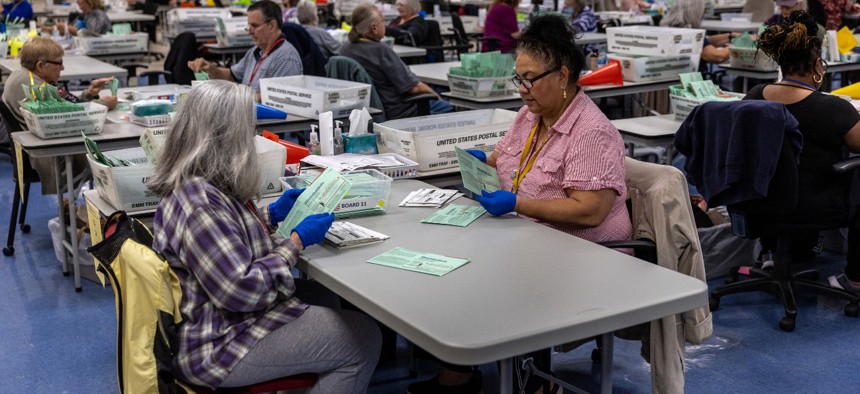
Election workers sort ballots at the Maricopa County Tabulation and Election Center on November 9 in Phoenix, Arizona. John Moore/Getty Images
How the Hatch Act Fared in the Lead-Up to the Midterm Elections
Allegations and violations this year were not much different from previous years, according to the Office of Special Counsel.
The lead-up to the 2022 midterm elections was pretty typical in terms of Hatch Act violations, according to the small, independent agency that oversees the law limiting the partisan political activity of government employees.
The Office of Special Counsel has received 98 Hatch Act complaints involving federal employees since May 1, said Zachary Kurz, communications director at OSC. The complaints involved both career staff and political employees, he said.
“OSC opens a case file and looks into every Hatch Act complaint it receives,” Kurz noted. “Not all of the 98 complaints received since May are still open. At this point, many have been resolved.”
He added that no particular agency “was remarkable with respect to the number of complaints we received. Anecdotally, this year did not differ much from [midterm] years past in a noticeable way.”
The top four allegations in complaints were: “use of official authority” to influence election results (39); “political activity on duty, in a federal room or building” (39); “candidacy” (27); and “solicitation” (14), according to Kurz, who noted that some complaints had more than one allegation listed. Also, there weren’t any specific trends in the types of complaints OSC received in the lead-up to the midterm elections, Kurz said.
The Hatch Act limits the partisan political activity of civilian federal employees, with the exception of the president and vice president. The military and U.S. Public Health Service Commissioned Corps aren’t covered by the Hatch Act, but each have their own limitations.
Most federal employees fall under the “less restricted” category and are afforded more ability to engage in off-the-job partisan political activity than those in the “further restricted” category, which includes federal employees at investigative and enforcement agencies. Federal employees should be aware that some agencies place employees in a further restricted category who otherwise would not be (for example the Justice, State, Homeland Security and Defense departments). Also, there are some exceptions to Hatch Act rules for political appointees.
According to a survey this fall of federal civilian employees and Defense Department employees (service members and civilians) by Market Connections, Government Executive’s research arm, 92% of respondents said they were familiar with the Hatch Act and 90% said they had had training on compliance. The data was collected from a random sample of 298 Government Executive subscribers from Sept. 19 through Oct. 19. It has a margin of error of +/- 5.6% at a 95% confidence level.
In the lead up to the midterm elections on November 8, Government Executive published a series on the do’s and don’ts of the Hatch Act, which can be found here.







